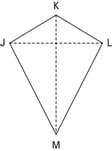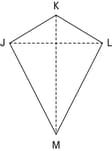Theorems Related to Quadrilaterals
Theorems Related to Quadrilaterals: Overview
In this topic, we will explore theorems based on quadrilaterals. It discusses the theorems related to the sides, angles, and diagonals of the different types of quadrilaterals. It also describes the use of these theorems to solve the questions.
Important Questions on Theorems Related to Quadrilaterals
Prove diagonals of rhombus are perpendicular to each other.
Prove that diagonals of rectangle are of equal length.
Prove that each of the angles of a square is a right angle and each of the four sides is of same length.
Prove: Each of the four sides of rhombus is of same length.
Prove that each of the four angles of a rectangle is a right angle.
Given an isosceles trapezoid with , if is the value of , then find the value of .

Given an isosceles trapezoid with , find the missing angles.

The base angles of an isosceles trapezoid are equal.
If the length of parallel sides of a parallelogram is and , each, then the perimeter is equal to:
The interior opposite angles of a parallelogram are:
Observe the kite given below and answer the following question:

If , then find the value of .
Observe the kite given below and answer the following question:

If , then find the value of .
Why every parallelogram is not a trapezium.
In a quadrilateral , and . Prove that .
The angles at the end points of the parallel sides of an isosceles trapezium are _____.
The diagonals of a trapezium divide each other into proportional segments.
is a rhombus such that one of its diagonals is equal to its side. Then the angles of rhombus are
